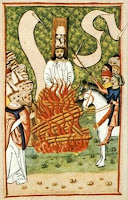 |
| Jan Hus at the Stake |
What is heresy? In many traditions, it is that which contradicts or denies a certain religious dogma. For example, if you claim that there is no God in a society where the belief in God plays an important role in its social and political structure, then you will possibly face certain consequences for your aberrant belief.
The important point to stress here is that there are two conflicting views, one considered orthodox, the other heretical or perhaps revolutionary. In a world where the orthodox belief is that there is a God, you may suffer consequences for not believing in Him.
In either case, it is a self-protecting mechanism. Dogma is generally not bulletproof as it is mainly based on faith, and it will sometimes not be able to sustain pressure or criticism. Dogma or rather orthodoxy is telling us what and how things are; they represent so-to-speak the rules of the game. You cannot make up your own rules as you go along but must embrace a given or established frame. Therefore, if the religion is monotheistic, you cannot believe in other gods as you would be “breaking” the rules.
There are some rules or rather infractions of them that may be considered minor. Is there not some leeway to adjust rules and to adapt them to changing circumstances? Yes and no.
In the Western tradition, most of us have mainly distanced ourselves from reading the Bible literally. In some cases, we even find contradictions. Should we be vengeful and follow the “eye for an eye” approach of the Old Testament or should we adhere to the meek and forgiving attitude of Jesus by turning the other cheek?
By and large, the Ten Commandments hold up even under modern scrutiny, but we do prioritize them. Is it the same to lie and to kill? Evidently there are varying degrees of actions that are followed by different consequences.
We do not imprison people for lying unless it happens in a legal setting, under oath, for instance. We do imprison people for killing unless it is under mitigating circumstances, such as a soldier in times of war or some cases of self-defense. Hence, religious authorities, albeit reluctantly, have been forced to adapt to new conditions.
But looking at the Catholic Church, there has been little movement or adjustment in this conservative institution. For example, it was only recently that the Church accepted it had erred concerning Galileo. Why is religious authority so slow to react?
The problem with set dogma is that even slight adjustments and concessions may put it slightly off balance. It goes hand in hand with the assumption that the dogma is true and that any diverging information is ipso facto false.
So what is a heretic? It is those who make claims and statements contrary to dogma. There have been disagreements over the Eucharist, for example, whether it is a symbolic act or whether the bread and wine are actually transformed into the body and blood of Christ. This issue alone has created splits and rifts within both Catholic and Protestant traditions.
When faced with concessions, orthodox leaders take a hard-line stance and will not negotiate. In other words, if you do not follow the rules, you are proclaimed a heretic. The consequences have varied over time. Today we may face excommunication, but in the past, death by burning was at stake for many so-called heretics.

No comments:
Post a Comment